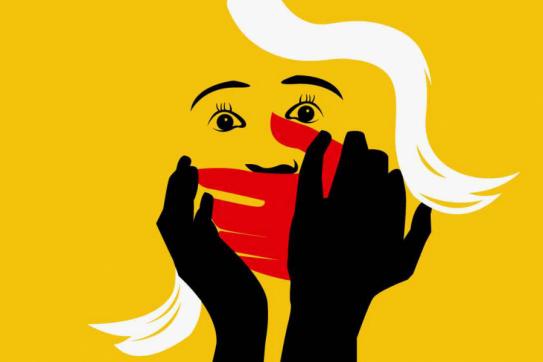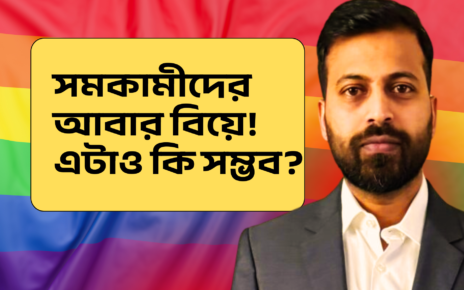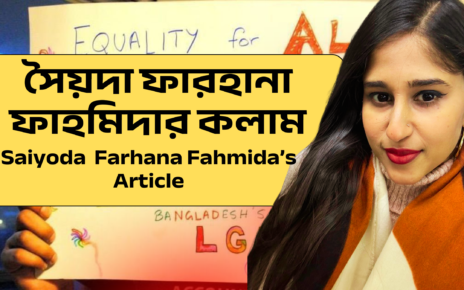Mohammad Foiz Hossain, United Kingdom
Bangladesh, a South Asian country known for its cultural diversity and deep-rooted traditions, has witnessed a growing threat to its LGBTQ+ community due to the rise of Islamist extremism. While the country maintains a secular constitution, radical Islamist groups and conservative societal norms continue to pose significant challenges for LGBTQ+ individuals. The intersection of religious extremism and homophobia has resulted in discrimination, violence, and even fatal attacks on those who dare to defy heteronormative expectations.
Legal and Social Discrimination
One of the fundamental reasons why the LGBTQ+ community in Bangladesh remains vulnerable is the legal framework that criminalizes same-sex relationships. Section 377 of the Penal Code, a colonial-era law, prohibits “unnatural offenses,” effectively criminalizing homosexuality with punishments including life imprisonment. This legal standing emboldens radical Islamist groups, who justify their actions against LGBTQ+ individuals under the guise of religious morality.
Additionally, deep-seated homophobia is ingrained within the societal fabric, where religious teachings often portray non-heteronormative identities as sinful. Many religious clerics, particularly those from hardline Islamist factions, have openly called for the persecution of LGBTQ+ individuals, reinforcing societal intolerance and exclusion.
Violence and Extremist Attacks
The LGBTQ+ community in Bangladesh has faced brutal violence, particularly at the hands of Islamist extremists. One of the most horrific incidents occurred in 2016 when Xulhaz Mannan, a prominent LGBTQ+ activist and editor of Bangladesh’s first LGBTQ+ magazine, Roopbaan, was murdered in his home by extremists linked to Ansar al-Islam, a militant group affiliated with Al-Qaeda. His killing sent shockwaves through the community and underscored the severe risks faced by those advocating for LGBTQ+ rights.
Such attacks are not isolated incidents. LGBTQ+ individuals frequently face death threats, physical assaults, and social ostracization. Militant Islamist groups exploit religious sentiments to justify these acts of violence, labeling LGBTQ+ activism as an attempt to corrupt Islamic values and undermine traditional family structures.
Islamist Influence on Politics and Law Enforcement
Islamist groups have managed to exert significant influence over political discourse in Bangladesh. Despite its secular constitution, the government often succumbs to pressure from radical Islamist factions to avoid alienating conservative voters. This has resulted in the suppression of LGBTQ+ activism and the lack of legal protection for sexual minorities.
Law enforcement agencies often turn a blind eye to violence against LGBTQ+ individuals, and in some cases, they have actively harassed and detained activists under vague pretexts. The fear of police persecution forces many LGBTQ+ people into hiding, preventing them from seeking justice or support.
Lack of Safe Spaces and Mental Health Impact
Due to societal hostility and religiously fueled stigma, safe spaces for LGBTQ+ individuals in Bangladesh are nearly nonexistent. Many people are forced to hide their identities to avoid being disowned by their families or targeted by extremists. This constant fear and lack of acceptance lead to severe mental health issues, including depression, anxiety, and suicidal tendencies.
Furthermore, conversion therapy—often driven by religious beliefs—continues to be practiced in the country, with families forcing LGBTQ+ individuals to undergo psychological and even physical abuse in an attempt to “cure” them. Islamist groups encourage such practices, claiming they help individuals return to the “path of righteousness.”
The Way Forward
Addressing the threats posed by Islamist extremism to the LGBTQ+ community in Bangladesh requires a multi-faceted approach:
- Legal Reforms: Repealing Section 377 and introducing anti-discrimination laws to protect LGBTQ+ individuals from violence and social exclusion.
- Countering Extremist Narratives: Promoting progressive interpretations of Islamic teachings that advocate for tolerance and inclusivity.
- Stronger Law Enforcement: Holding perpetrators accountable for hate crimes against LGBTQ+ individuals and ensuring that law enforcement agencies act impartially.
- Community Support: Establishing safe spaces for LGBTQ+ individuals to access mental health support, legal aid, and social networks.
- International Pressure: Encouraging global human rights organizations to advocate for the protection of LGBTQ+ rights in Bangladesh and hold the government accountable for its actions.
Conclusion
The rise of Islamist extremism in Bangladesh has created an unsafe and hostile environment for the LGBTQ+ community. The intersection of religious radicalism and legal oppression has forced many LGBTQ+ individuals to live in fear, hiding their identities to survive. Addressing this issue requires concerted efforts from the government, civil society, and international stakeholders to challenge homophobia, protect human rights, and promote a more inclusive society. Until these changes are made, the lives of LGBTQ+ individuals in Bangladesh will continue to be at risk, simply for being who they are.


